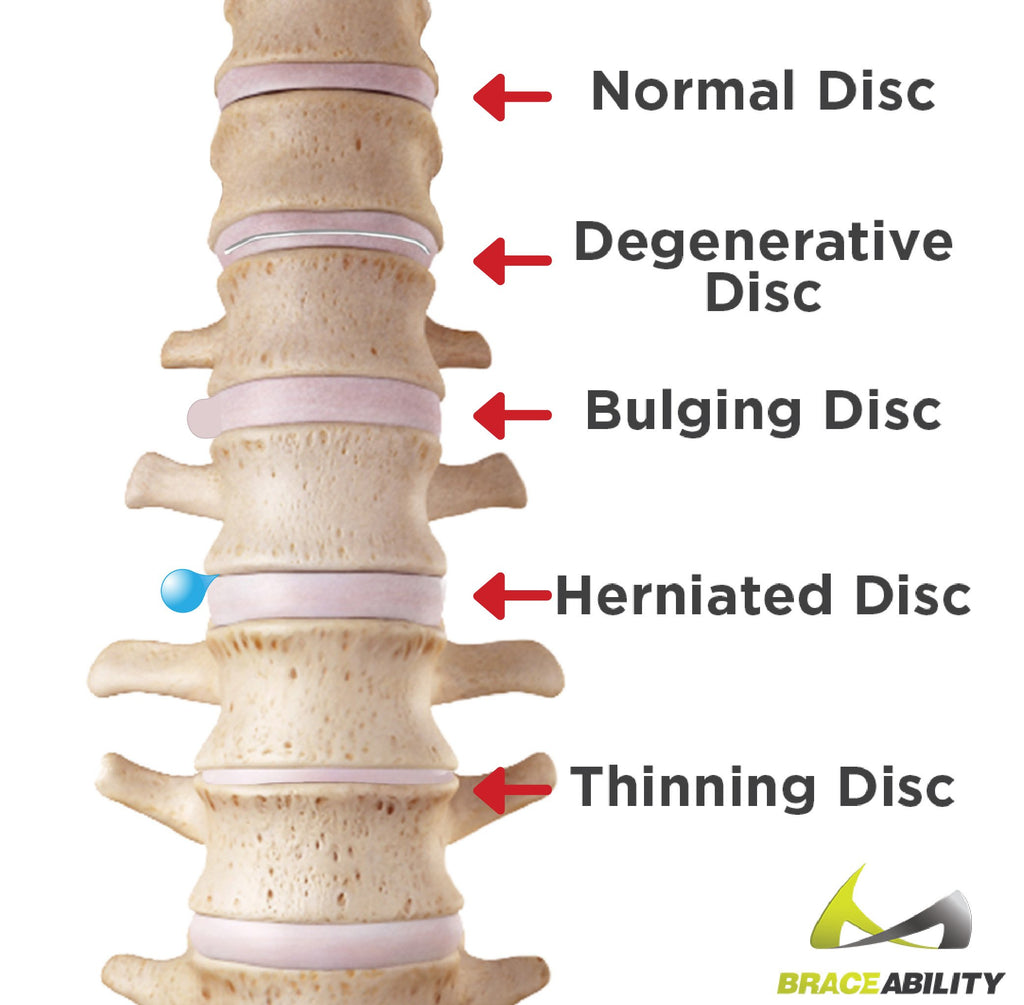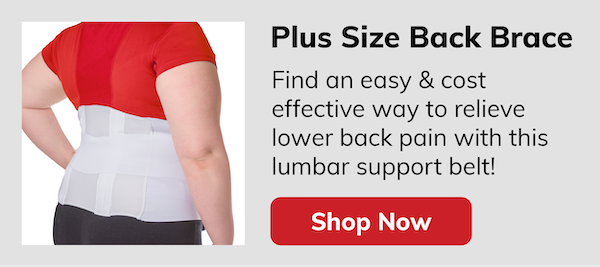Back Pain Caused by Obesity | Health Risks & Treatments
What Does It Mean to be Obese - What Weight is Obese Weight?
Obesity is medically defined as excess adipose tissue. You may be wondering what does that mean? Well, adipose tissue is the medical term for fat or loose connective tissue. If a person is deemed obese, he or she has accumulated enough body fat to the point where it is negatively affecting their health. In general, you are not considered obese until your body weight is at least 20% higher than it should be. The most common way to determine excess adipose tissue is the body mass index or BMI. I’m sure you’re wondering... How do I do that? Thankfully, at BraceAbility we have created a helpful blog post to determine your body mass index.
What are the Most Common Health Risks Caused by Obesity?
-
1. Type 2 diabetes - A chronic condition that alters the way the body processes blood, sugar, or glucose.
-
2. Some forms of cancer - Breast, pancreas, colon, rectum, esophagus, and endometrium.
-
3. Osteoarthritis - The excess weight puts even more strain on your joints causing your cartilage to degenerate
-
4. Sleep Apnea - When your breathing cycle alters while you sleep causing you to take prolonged shallow breathes
Unfortunately, obesity also causes the muscles, joints, ligaments, bones, and organs to work harder in order to support your body. It’s because of this that people who suffer from obesity tend to have chronic back, knee, and overall body pains.
How does Being Overweight Affect your Lower Back and Spine?
In general, people who are overweight are at a much greater risk to suffer from back and spine pain, or any muscle or joint issues. In fact, there is a pretty direct link between obesity and spine issues. Essentially, the excess weight that is carried by an obese person puts additional strain and pressure on the spine. Thus, increasing potential injury to the spine and back. There are a variety of different conditions that may occur in the back region because of obesity that will be discussed in detail below.
People who suffer from obesity have an increased risk for problems specifically in the lumbar region (lower back). Because there is excess weight in the midsection, the pelvis is pulled forward, straining the lower back and creating lots of pain and medical issues.
How Does Having A Large Belly Affect My Back?
If you have excess fat in your belly, you are likely to experience side effects. Your core is your center of gravity and will shift with excess weight. This shift will pull your body forward and potentially strain your back. The shift will also cause your body to hold an unnatural posture that in return can cause lots of back pain, and down the line back issues. Many people have a medical condition called pendulous abdomen. With pendulous abdomen, the girth around your lower abdomen is enlarged or overextending. This is usually due to overeating and is extremely common in obese people. The pendulous abdomen is a condition that likely leads to back pain because of the excess fat. Because of this, BraceAbility has designed a brace to help stabilize the abdomen and back region.
Poor posture also tends to be one of the leading causes of back pain, especially if you are holding it for extended periods of time. Thankfully, there are many steps you can take to initiate correcting your posture. At BraceAbility we have a large variety of posture correcting braces that are a great way to alter your muscle memory. Specifically, check out the posture corrector made for plus-size individuals. The best part about changing your posture is that it can create weight loss. The muscles in your core are forced to work a little harder to hold yourself upright.
If I am Overweight, what Back Injuries or Spine Problems might I have?

Herniated Disc
A herniated disc is when the inner core of your vertebral disc ruptures. This rupture then causes it to burst through the crack of the outer piece. The chances of suffering from a herniated disc increase if you’re overweight, among other things. If you’re carrying around excess body fat, even more strain is placed on your intervertebral disc. Thus causing the deterioration of your bodies disc to happen at a much faster rate.
BraceAbility has a variety of herniated disc braces if you’re obese and suffering from the injury.
Bulging disc
Similarly to a herniated disc, being overweight or obese is going to increase strain on your back and spine. A bulging disc occurs when your vertebral disc pushes out of its normal position and begins to invade the space of your spinal nerves. This is more common in obese people because of the already increased strain that is placed on the back and spine from excess weight.
BraceAbility has a variety of bulging disc back braces if you’re obese and suffering from the injury.
Compression Fracture
A compression fracture of the back happens when your vertebrae, or bones of the spine, break. Compression fractures can occur anywhere in the spine, but most commonly in the lower thoracic spine and upper lumbar spine. Because the excess weight in this area is more prone to cause pain in obese people, compression fractures can become very common.
BraceAbility has a variety of compression fracture braces if you're obese and suffering from the injury.
Degenerative Disc Disease (DDD)
Degenerative disc disease refers to the changes that happen during the body’s natural aging process. The disease is the weakening of one or more of the disc between the vertebrates. If it’s a natural aging process you’re probably wondering about its connection to obesity. Just like other conditions of the spine, it’s all about the weight strain that is placed on it. Essentially, DDD is more common in overweight people because the excess weight speeds up the aging process.
Read our article on degenerative disc for more information.
BraceAbility has a variety of DDD braces if you're obese and suffering from the disease.
Osteoarthritis of the Spine or Arthritis of the back
Osteoarthritis is the most common joint disorder that can occur anywhere, including your hands, knees, back, and neck. Osteoarthritis of the spine is a breakdown of the cartilage in the joints of your neck and lower back. Just as with the other spinal conditions, the excess weight is placing more strain on the spine. However, osteoarthritis of the hands is also more common in overweight or obese individuals. Some doctors believe your chances of osteoarthritis increase when you’re obese because of your bodies ability to circulate blood and oxygen decrease.
Lordosis
Lordosis is also known as swayback. It is a condition in which the spine in the lower back has an excessive curvature. A large belly will naturally pull your pelvis forward, which will create a larger curve in your spine. This will most likely cause major strain and pain in your back muscles.
How Will Losing Weight Affect My Back?
If you are a man or woman who is overweight or obese you most likely recognize the health benefits you would receive with weight loss. Shedding some pounds could reduce your back problems, lower your risk for certain cancers, and ultimately add years onto your life. However. it’s important to understand what is really happening to your body as you begin to lose weight, especially if you are suffering from a weight caused back condition. As you begin to trim off the excess fat on your body, your muscles don’t have to work as hard. Essentially, day to day tasks become easier for your body to handle, which results in less pain experienced. The less you strain your joints, muscles, and bones, the healthier you become. Although the task of losing weight is difficult, it is possible. Let the numerous health benefits you will begin to receive be your motivation.
Could I Experience Back Pain After Extreme Weight Loss, Especially In Post Surgery Situations?
Although weight loss will most often help health problems you are experiencing, there are some cases where extreme amounts of weight loss may create back pain. It is not uncommon for people who have surgery to remove excess weight to run into back issues post op.
With bariatric surgery, people will complain about back pain in post-surgery recovery. Commonly with gastric bypass surgery, the location of the back pain varies but generally is in the mid to lower back. This type of pain from excessive weight loss may be attributed to reduced body fat because it lowers cushioning, potentially creating discomfort or affecting your spinal alignment. When considering if you should get gastric bypass surgery it’s important to be aware of the side effects that come along with the procedure. The main symptoms of gastric bypass surgery include dumping syndrome, dehydration, gallstones, hair loss, indigestion, and back pain.
In most situations, people who undergo a bariatric weight loss surgery will have had more severe back pain prior to surgery rather than post surgery.
I am Overweight and My Back Hurts - When Should I See A Doctor?
If the back pain you’re experiencing is persistent and debilitating, visiting a doctor is your best option. Initially, you may just want to visit with your family's general practitioner. However, you may have to eventually visit with a more specialized surgeon depending on the severity of your condition and whether or not it has to do with your spine. Occasionally, back pain is a symptom of a much more serious condition that you would want a doctor to diagnose. Many of the above conditions make take a doctor's diagnosis before you really know what is going on.
Lower Back Pain when Walking or Standing
It is not uncommon for people of all ages to experience lower back pain while standing or walking. This kind of pain can be extremely frustrating as it limits you from being able to perform simple tasks that are heavily apart of everyday life. Most often someone who is having back pain while he or she is walking or standing has an issue with degenerative discs. Like we stated early, suffering from degenerative disc issues becomes increasingly more likely with the more excess weight you’re carrying on your body. The excess weight stresses out your body's muscles, joints, etc ultimately causing them to deteriorate faster.











